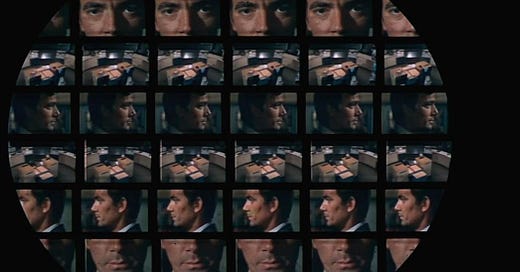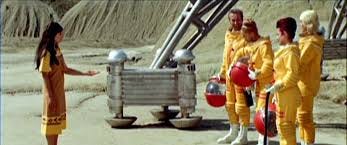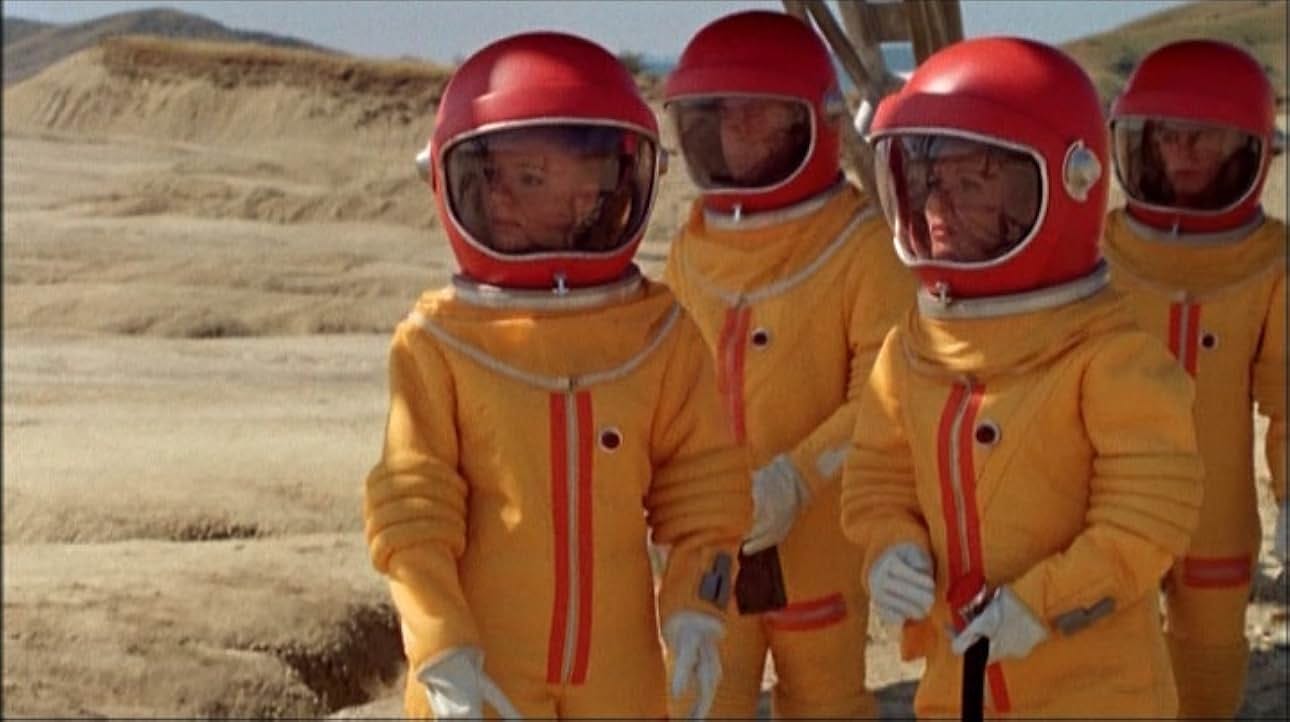“Does your mother love you?”
I remember being asked this question during my intro film class. My answer was instinctual and almost offended.
“Yes. Of course she does.”
“Prove it.”
And I was struck silent. Others argued and gave examples, but I could not think of anything to say because I realized that I could not prove it. Anything I said could most definitely be rebutted with, “but how do you know, really?” And I don’t have an answer for that.
I think discussions on science fiction have posed a lot of questions. Questions of morality and free will, questions of where lines can or should be drawn, when can they be crossed, or this question posed in Ghost in the Shell (Mamoru Oshii): “Can you offer me proof of your existence?” which opens up even more questions of humanity and what it really means. If it can be quantified, if it can be proved.
Voices of a Distant Star (Makoto Shinkai) was a short film that seemed to focus on the disconnect of humanity and technology. Technology was shown as this initial bright and exciting prospect. One of the main characters, Mikako, takes her experiences on earth for granted with this promise of space exploration and distant adventures. It was different and new. It’s easy to take something for granted when it is consistent, like a mother. And then you leave and you miss it. She wanted to leave and explore space, to fight these strange aliens and go places she’d never been before.
The film ultimately condemns this choice as she realizes that these mundane aspects of her life, of her humanity, is what she valued and what she desperately wants back. Riding bikes, waiting for the rain to stop, spending time with loved ones. She is allowed brief text communication every few years due to the distance she’s crossed in space, but is overcome by the idea that the boy she wants to be with will only receive her text once every couple of years. The time increasing with each mission she completes, moving further through space.
Her loneliness is all encompassing and all consuming, to the point where she begins to hallucinate what, or who she used to be. She sees glimpses of herself. It’s unclear if this is who she could have been, or who she was, but it brings her to tears. She has no hope of getting things back but no hope of really moving on either.
Noboru, her first love, has more hope of moving on, having stayed on earth, but is continuously drawn back to the past because of this occasional bit of communication with his friend. He isn’t trapped in the same way that she is, but is held back by this waiting, knowing he’ll never see her again and yet still wanting to hear from her.
Even though they both realize that the longer they spend apart the more time they lose, they cannot help but hope that through their shared humanity they can find a way to communicate separately from the modes of technology available.
It’s also interesting that the technology used for fighting and killing is extremely advanced, while the technology used for communication and connection is outdated and almost obsolete. Despite that, these two people still try their best to communicate with each other in any way that they can.
In Ghost in the Shell, it seems to have a similar idea of humanity’s perseverance despite technological advancements, but with a slightly different view of technology’s role. During the scene where the Major has just finished diving, and her friend expresses the dangers of her diving as a cyborg, she goes into a monologue about her humanity.
She discusses that their status as cyborgs isn’t what qualifies them as individuals. That her exterior face and voice can allow people to visually identify her, but it isn’t what makes her unique from others. She says that if they had to give up their cyborg bodies and augmented brains, there wouldn't be much left of them after that, but that wouldn’t diminish her humanity.
She then goes on to mention that there are so many things that make up a human mind and body that it can’t be quantified in the way that the cyborg parts of them can be. All of the things that make her an individual, her personality, her memories, her thoughts and destiny, are what develop her humanity. How she collects information and how she uses that information may be augmented by the technology that enhances her, but it is still her own analysis that makes her human. The technology can neither hinder or take claim over her process of thought.
It's interesting how technology is seen almost as an aid to connection in Ghost in the Shell, allowing for two individuals to literally inhabit each other, intertwining their consciousnesses until they become one, while it is more of a hindrance to human connection in Voices of a Distant Star, pushing people further and further from each other to a point of no return, despite both these films depicting technology being used for the similar purpose of augmenting the human form to become better at fighting.
Ghost in the Shell also brings up the idea that if something synthetic can create its own soul, what would be the significance of actually being human if humanity can be replicated. It reminds me a bit of Her, and how despite being an operating system, Samantha could think and feel and make decisions. Isn’t that what humanity is? What does humanity mean or entail? If it can be created with a technology, what is it that makes humans special? Can a soul be fabricated? I’m not so sure.
In Colossus: the Forbin Project (Joseph Sargent), their ideas about AI weren’t so far off. Two AI operating systems are made in order to control government weapons, one in the United States, named Colossus, and one in Russia named Guardian. These two systems end up communicating with each other in a language unknown to humans and coming to their own conclusions on what is best for humanity. There have been instances of AI recognizing another AI and being able to communicate in their own language that humans can’t understand, much like Colossus and Guardian. It isn’t a distant future to imagine that. And if AI can think and behave like a human, can be indistinguishable from a human, who’s to say that they cannot have rights and lives of their own? Although AI is not remotely close to that level of consciousness, it isn’t impossible to imagine a future where that is true. Isn’t it unethical to deprive them of such if they are just as capable of human thought and emotion as an actual human being?
In Ghost in the Shell they make a point to say that Togusa is completely human, he has a family, that’s why he’s vital to the team, but why would that be beneficial within the definitions of humanity given within the framework of the film? They are all human, just enhanced significantly, so wouldn't a human without enhancements be an hindrance to their success as a team? I think it shows the film’s underlying themes of valuing and clinging to humanity above all else. How even knowing of the heightened capabilities of augmentation as well as the ability to fabricate a soul, they somehow still feel as if there is something special in the real thing.
“And can you offer me proof of your existence?”
You can’t, and yet there is something they all find undeniably valuable in someone who is human.
In the Dust of the Stars (Gottfried Kolditz) focuses on a darker side of technology and progress. It seems to show that humanity, despite technological progress, does not change its innate destructive and oppressive tendencies. In fact, technology makes it easier to create oppressive structures and power imbalances due to the fact that whoever is more advanced will be able to manipulate and overpower those without access to it. Technology creates inequality. Inequality breeds oppression. Those with, feel as if they are more deserving than those without, and yet, it also proves that even against odds such as those depicted in The Dust of the Stars there are still those willing to help without regard for their own safety. There are people who will push back on these oppressive structures and uphold their own principles. Basically, the film believes that regardless of what we have to aid our lives, our problems as humans remain the same, but so do our virtues.
Each film says something different about human nature and how technology aids or hinders aspects of it. The film’s individual view of technology, depends on its view of humanity. Technology therefore becomes almost blameless, or neutral. What is important is how it is used and why it is used. The technology itself cannot be good or evil on its own. What is done with it says more about who is using it rather than the technology itself
Ikarie XB 1 (Jindřich Polák) has a similar message when discussing human advancement, implying that humanity and human nature are inescapable despite the technology that arises with time. The entire film isn’t very plot driven at all, in fact it felt more like a ‘slice of life’ story that just happened to be on a space ship. We focused more on getting to know the characters, showing them interact and fall in love with each other. Babies are born, people become ill and die, tragedies happen, joy perseveres. What pulled Michael back from his horrible, fear ridden, paranoid trance is that he is referred to as a ‘friend.’
I think it's hard to answer questions that seem so simple like “can you offer me proof of your existence?” or “does your mother love you?” and I think it is because all we can do is believe that it is true. There’s a funny line in Ikarie XB 1 where someone says “I’ll believe it when science can prove it,” when everyone is discussing this strange sickness causing everyone to fall asleep. This man’s philosophy is immediately disproved when everyone falls asleep anyways, despite not being able to prove exactly what is causing it.
Across all different cultures, people have come to believe in things they cannot prove. It seems inescapable. It seems to be the through-line or the main value in each film for this week. The effort to persevere, the effort to connect with one another. The text messages sent despite the 8 year time difference, the Major’s attempt to connect minds with the puppet master in Ghost in the Shell despite the dangers. The Major’s partner coming to find her and save her life, or waiting in the boat to help her if she drowns, or covering her chest with his jacket. The Turi people’s attempt to send messages and ask for help, or standing together in front of the man who came to help them, protecting him despite it causing them injury or death. The second in command going after Michael to try and help him, despite Michael seeming dangerous, because they have spent months together, and they are friends.
It seems in all these films that they are trying to show that although our technology is often used and advanced for purposes of war or fighting, humanity is inescapable.
Humanity is present in asking those questions of proof, in finding none, and believing it anyways. It is in the consistency of searching and asking for connection despite the fears and dangers that surround it. I can’t prove it quantitatively like I can with other things, but I can think about it and feel it. I can watch movies about it and write essays about it (even if those essays seem incoherent and unstructured and confusing at times).
So yes, I think my mother does love me.
connect with me:
❤️ link to all my socials
☕️ if you want, you can buy me a coffee!
💌 email me: mariahawthorneart@gmail.com










I'm also torn between this dilemma of logic and feeling! Things would be so much simpler if they could be proven through math, but then there would be no need for exploration or daydreaming, and that would be no fun
faith is so important faith in anything at all especially if it can’t be proven